MARINE CORPS BASE HAWAII, HI —
Across the thick jungles and mountainous terrain of Oahu, U.S. Marines participating in the Advanced Infantry Marine Course execute their patrol plans under the watchful eye of their combat tested instructors. Each iteration of the course is mentally rigorous and physically demanding, pushing Marines to the limit of their capabilities, and molding them into ready, highly proficient warriors.

Over seven intense weeks, Marines hone multiple infantry skills such as calling for fire and close air support, patrolling techniques, jungle and urban terrain warfare, and casualty care. Each skill is first taught in the classroom, followed by demonstrations and practical application in the field. For these Hawaii Marines, training took place aboard Marine Corps Training Area Bellows and throughout the Kahuku Training Area, each offering a unique, and realistic venue to prepare for modern warfare. “MCTAB and KTA are perfect for creating authentic and realistic training scenarios for our students…” said Staff Sergeant Ricardo Hernandez, Staff non-commissioned officer in charge for Advanced Infantry Training Battalion, Hawaii Detachment.
[blockquote: “MCTAB serves as a crucial component in shaping the training experiences of our infantry marines.”: Staff Sergeant Ricardo Hernandez, Staff non-commissioned officer in charge for Advanced Infantry Training Battalion, Hawaii Detachment.
“The training areas have been designed to simulate urban environments, encompassing a diverse range of scenarios.”
For the students, all infantry Marines, the tropical climate, and the effects on the body present another variable for consideration during long patrols and extended operations in the field. This additional layer of realism offers a unique opportunity to students to make decisions and gain leadership experience when they are tired, hot, sweaty, and hungry. Sgt. Connor Hoovler, a rifleman with 3d Littoral Combat Team, 3d Marine Littoral Regiment, 3d Marine Division, attests to the environmental impacts, “The climate and humidity make this course more difficult. Staying hydrated and maintaining peak performance are a constant struggle we face.”
Aside from development of individual skills and the opportunity for Marines to learn more about themselves in stressful situations, AIMC also collectively develops cohesion, teamwork, and camaraderie. Even in the thick and humid jungle air, the students share a common bond – the ‘ohana spirit’ – thought responsible for building strong and resilient families. “Living out in the field for weeks at a time, your Marines to your left and right become life family,” Hoovler added. “Trust and seamless cooperation are crucial for team success.”
At the heart of AIMC lies the development of an adaptable mindset and decisive problem-solving skills. Marines learn to thrive in unpredictable environments and must make sound decisions on the fly. “The ability to devise effective solutions under pressure is invaluable,” said Lance Cpl. Nicholas D’angelo, a rifleman with 3d LCT, 3d MLR, 3d MARDIV. “It instills confidence and transforms us into more capable leaders.” Under high-pressure scenarios, trainees are tasked with crucial leadership roles and decision-making. “During the fleet event, I led my squad through a challenging blocking position, formulating and executing a plan under tight timeframes that tested my leadership abilities,” Hoovler said.
Completing the AIMC is a badge of honor and garners respect within the Marine’s platoon and their entire company. While it is a career requirement for many Marines, it serves as a stepping stone and showcases their dedication to their Military Occupational Specialty. AIMC is more than a training regimen; it’s a transformative journey that forges warriors. “The training environment at Marine Corps Base Hawaii is meticulously designed to deliver an unmatched level of realism, preparing our Marines for the complex and ever-evolving challenges of modern warfare,” said SSgt. Hernandez. These Marines emerge stronger, more resilient, and better equipped to face the unknown challenges that await them on the battlefields of the future, standing ever ready for any clime and place.
By Cpl Cody Purcell | Marine Corps Base Hawaii

